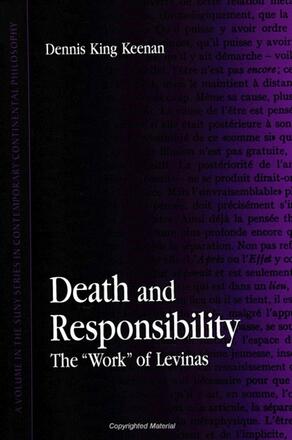
Death and Responsibility
The "Work" of Levinas
Alternative formats available from:
Richly informed by readings of Heidegger, Derrida, and Blanchot, the author argues that the notion of responsibility at the heart of Levinas's notion of ethics is intimately dependent upon his account of death.
Description
The work of Levinas has, for the most part, been too easily read. Levinas's use of words like "responsibility" and "God" gives some readers reason to dismiss his work as insufficiently attentive to the whispered suspicions of our times, while giving others reason to accept his work as a clarion call guiding them out of this wilderness of disorienting whispers. Richly informed by readings of Heidegger, Derrida, and Blanchot, Keenan argues that the notion of responsibility at the heart of Levinas's notion of ethics is intimately dependent upon his account of death.
Dennis King Keenan is Assistant Professor of Philosophy at Fairfield University.
Reviews
"Dennis King Keenan is an extremely perceptive reader of texts. His method, comparison and juxtaposition to create a kind of textual layering, elicits original insights into Levinas, Heidegger, Blanchot, and Derrida. The approach to Levinas by way of Blanchot's 'step/not beyond' and the concept of the double origin render a significant contribution to Levinas studies and to analyzing the relation of Levinas to Heidegger, Derrida, and Blanchot. " — Edith Wyschogrod, coeditor of Lacan and Theological Discourse
"This book is a sophisticated, nuanced deconstructive reading of Levinas. I heartily agree with its main thesis; until now this connection has not been adequately dealt with in any other book-length discussion of Levinas's work. " — Simon Critchley, coeditor of Deconstructive Subjectivities